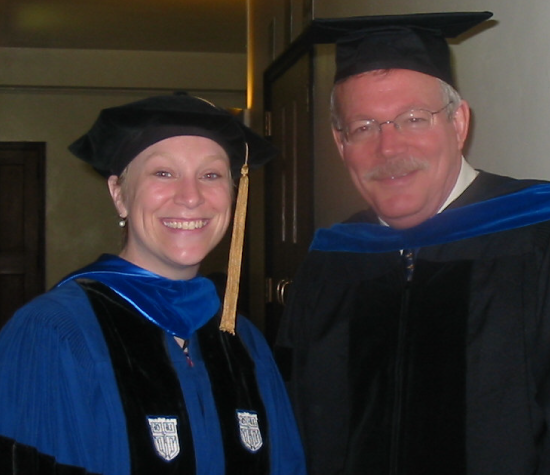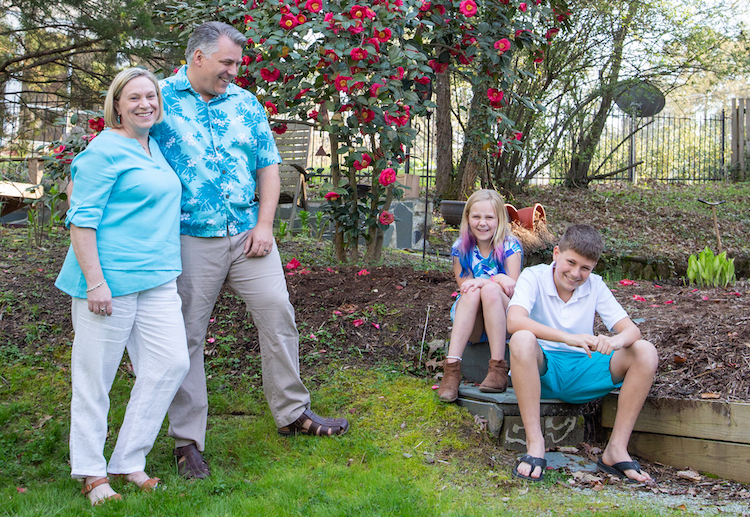In February 2020, Leah Houde was hired as PricewaterhouseCooper’s new chief learning officer. The Duke University graduate and former Duke Corporate Education executive was excited about the opportunity to work with PwC’s global workforce. “I inherited a learning organization that designs and delivers world-class learning assets,” Houde says. “It’s a CLO’s dream.”
On February 24, she completed an in-person orientation in Atlanta, where she met a few of the core team members. Then she flew home to New York to get ready for her new job. The following night, while waiting in line to pick up a pizza, she got the call from her new boss letting her know they were shutting down all of PwC’s offices due to COVID-19.

“Everything happened overnight,” Houde marvels. Instead of heading out on a whirlwind meet-and-greet tour, she spent the next few weeks setting up a home office and meeting virtually with team members and employees — who she still hasn’t met in person. “I was talking to 20 people a day all over the country about how to transition all of PwC’s learning to digital,” she says.
PwC has 284,000 employees in 151 countries. As a leading professional services organization, its consultants are expected to understand the latest trends in cybersecurity, human resources, accounting, analytics and other evolving big business issues. To do that, they need constant training to stay current, Houde says. “Because we are consultants to our clients, our people have to be able to explain what’s new and what these trends mean for their businesses.”
From student to master
Shifting such a huge quantity of education to a totally virtual environment would have been a monumental task for any learning leader, but PwC was lucky to have chosen Houde to lead that effort. “It was obvious she was perfect for the role,” says Blair Sheppard, global head of strategy and leadership for PwC. And he would know.
Before joining PwC, Sheppard was a professor at Duke University’s Fuqua School of Business, where he taught Houde as an undergrad student, acted as her adviser for her dissertation in organizational psychology, and later hired her to help him create Duke CE.
Houde became one of Duke CE’s founding members while still completing her Ph.D., and she helped Sheppard’s team build it into a world-class destination for custom executive education. “Duke had done executive ed for decades, but when we spun it out as a new business it was an opportunity to treat it like a start-up company,” she says.
Despite her youth and inexperience, Houde quickly became an essential part of that team. “Leah had a massive exuberance for life and deep intellectual curiosity, but it was balanced by practicality,” Sheppard says. “The combination was an irresistible force.”
“The question we are always asking ourselves is, ‘how can we do the next big thing, and what needs to be true to make it happen?’ I see my job as clearing the path, and making what needs to be true accessible.
”
He notes that she was especially good at helping clients define their business need and understand how — and whether — a custom training program could address that need. “She had the integrity to say no when education wasn’t the issue, and the imagination to design something great if it was.”
In that role, she also learned how to be nimble in a crisis.
Houde came to Duke CE a year before 9/11, which caused most companies to ban most travel and to reign in executive education budgets. “She kept her sense of calm, humility and humanity through that time,” Sheppard says. “That made her more resilient.”
Houde is now using lessons learned from her time at Duke CE to shepherd PwC through its transition to virtual learning amid the pandemic, while also helping the organization create a more resilient and inclusive culture.
Learning to learn in a pandemic
As a global consulting and tax advisory firm, reskilling and upskilling the workforce is key to sustaining success. And leveraging technology to make that happen was a core tenet of the company’s learning philosophy long before the pandemic arrived.
Around 2016, PwC began integrating digital learning into its core offerings. By 2020, 43 percent of the company’s learning occurred digitally via live virtual events and a robust collection of digital content that includes custom learning paths and digital badges. Prior to the pandemic, PwC was happy with that balance of in-person and digital learning. “The corporate target was 40 percent digital and 60 percent in person,” Houde says.
But once the pandemic began, that 43 percent had to skyrocket to 100 percent overnight. Houde and her team scrambled to identify all of the most important in-person content and quickly transition it to digital, using online content and live virtual events. “We were fortunate that we had the platforms and capability to develop and deliver learning virtually,” Houde says.
Within three weeks, every critical live learning program had been converted to digital, and 55,000 professionals were engaging with the training. Once all of the core content was online, Houde worked closely with DeAnne Aussem, managing director of leadership development and well-being leader for PwC, to expand the company’s well-being and mental health training options and to create workshops and virtual training events to teach managers how to lead from afar, how to identify and address mental health issues, and how to create culture and connectivity in a remote work environment.
Houde came to PwC already believing that physical and mental well-being are critical components of work, which was important, because PwC defines well-being as a leadership skill, Aussem says. It is at the core of the company’s “Be Well, Work Well” philosophy, which says that in order to thrive, employees need to embrace practices that energize them and prioritize their well-being.


“Leah is very empathetic,” Aussem says. “She brings an interesting mix of heart-based leadership, with crazy good consulting and analytics skills.”
Aussem and Houde still talk every day about how they can integrate well-being into the learning culture, and to make sure people are learning how to prioritize themselves and their people through this crisis. Through these conversations, they decided to make several of their mental health courses available publicly after seeing customers struggle with many of the same workforce well-being challenges.
“It’s one way that PwC is giving back,” Aussem says. The free content includes a five-episode series of learning simulations to help people navigate conversations around mental health, as well as a mental health companion guide.
Diversity starts with education
While the pandemic has been the defining factor in Houde’s time at PwC, not all of her innovations have been pandemic-related. She’s also launched a powerful new program to help PwC attract more people of color to its ranks.
PwC has struggled for years to bring more diversity to its U.S. tax and accounting teams, which is one of the company’s key service offerings. Houde discovered that a big part of the challenge is that very few people of color get their CPA license. She notes that while one in five people in the U.S. is Black, only one in every 100 CPAs are Black. That creates a significant recruiting challenge.
When she dug deeper into this trend, she found the issue isn’t lack of interest. “There are systemic barriers to entry,” she says.
Getting a CPA requires 150 college credit hours, which means students need to spend a fifth year in college, which adds a huge financial burden that simultaneously delays their ability to start generating income. Then, once they graduate, candidates have to work under a certified CPA before they can sit for the exam.
“It’s an expensive process, and there is a long history of white CPAs hiring white CPAs,” Houde says. “It is a systemic problem that led to the underrepresentation of minorities in the accounting profession.”
Rather than trying to hunt down the few people of color who managed to overcome these barriers, Houde decided to get the barriers out of their way. “It’s time to stop making excuses and start taking actions,” she says.
“Leah is very empathetic.
She brings an interesting mix of heart-based leadership, with crazy good consulting and analytics skills.”
Her solution emerged through a partnership with Northeastern University, where they collaboratively created a 30-credit year-long degree program focused on accounting and tax courses, data analytics, leadership and business acumen.
Internally, PwC created a new fellowship program called While You Work that specifically recruits candidates of color who apply to the Northeastern program. If they are accepted by Northeastern and PwC makes them an offer, they spend their first year completing the program while working with PwC CPAs. “We pay their tuition, so they come out of it with zero debt, and they are working at the firm and getting an income the entire time,” Houde says.
PwC expects to put 40 people through the While You Work program, and Houde is planning to create similar programs for other areas of the business, including artificial intelligence and cloud computing, which could benefit from more diversity in their ranks.
It’s a big and expensive approach to solving a workforce diversity issue, but Houde has received strong support from stakeholders. The biggest challenge was figuring out how to create the right kind of work experience for fellowship candidates so they could learn and grow while also adding value to the organization.
“This is an investment that is consistent with the diversity goals of the firm,” Houde says. So it wasn’t a hard idea to sell. The company recognizes the benefits of having a more diverse and inclusive workforce, and this program will help them achieve it in a way that bolsters recruiting efforts.
Houde sees the While You Work program as a perfect example of her “Optimistic Business First” approach to leadership. “The question we are always asking ourselves is, ‘how can we do the next big thing, and what needs to be true to make it happen?’” she says. Whether the answer to that question is transforming every piece of learning content to a digital format, or providing diverse candidates with the education and experience to get their CPAs, she is ready and eager to tackle the barriers and to convince PwC leaders to support these goals.
“I see my job as clearing the path, and making what needs to be true accessible,” she says.















